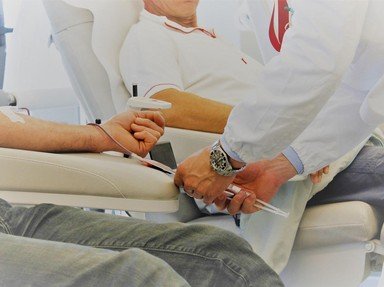Quiz Answer Key and Fun Facts
1. You decide that you want to become a blood donor, so you go to your local blood donation center. Before you are allowed to give blood, you will be asked to complete a questionnaire. What purpose does this serve?
2. What might be a reason that you would NOT be allowed to donate blood?
3. After filling out your questionnaire, a nurse will take you into a room where she will take your temperature, blood pressure, and measure your heartbeat. She will also review your questionnaire with you, and answer any questions you may have. She will then prick your finger and take a small sample of your blood (about one drop). Why does she do this?
4. If all goes well, you will be taken to a couch and asked to lie down. A phlebotomist (a person trained to draw blood) will prepare you for your donation. He or she will do all of the following, with what exception?
5. How much blood will they take from you during your donation?
6. How long will the actual donation (bleeding into the collection bag) take for most people?
7. After your donation is complete, the phlebotomist will remove the needle and bandage your arm. What happens next?
8. Donating blood is extremely dangerous.
9. Since your experience as a blood donor has been a pleasant one, you would like to come back and donate again as soon as possible. How long, in the USA, will you have to wait until you are eligible to donate again?
10. The blood center may turn you away if you have a very common blood type. Usually only the rarer types are needed.
Source: Author
daver852
This quiz was reviewed by FunTrivia editor
rossian before going online.
Any errors found in FunTrivia content are routinely corrected through our feedback system.

